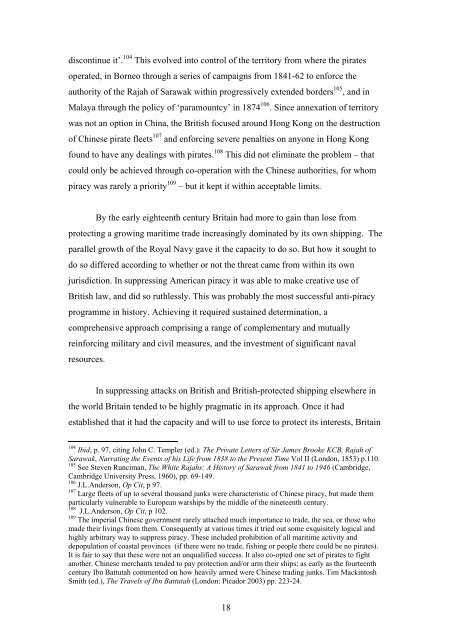to get the file - Defence Academy of the United Kingdom
to get the file - Defence Academy of the United Kingdom
to get the file - Defence Academy of the United Kingdom
Create successful ePaper yourself
Turn your PDF publications into a flip-book with our unique Google optimized e-Paper software.
discontinue it’. 104 This evolved in<strong>to</strong> control <strong>of</strong> <strong>the</strong> terri<strong>to</strong>ry from where <strong>the</strong> pirates<br />
operated, in Borneo through a series <strong>of</strong> campaigns from 1841-62 <strong>to</strong> enforce <strong>the</strong><br />
authority <strong>of</strong> <strong>the</strong> Rajah <strong>of</strong> Sarawak within progressively extended borders 105 , and in<br />
Malaya through <strong>the</strong> policy <strong>of</strong> ‘paramountcy’ in 1874 106 . Since annexation <strong>of</strong> terri<strong>to</strong>ry<br />
was not an option in China, <strong>the</strong> British focused around Hong Kong on <strong>the</strong> destruction<br />
<strong>of</strong> Chinese pirate fleets 107 and enforcing severe penalties on anyone in Hong Kong<br />
found <strong>to</strong> have any dealings with pirates. 108 This did not eliminate <strong>the</strong> problem – that<br />
could only be achieved through co-operation with <strong>the</strong> Chinese authorities, for whom<br />
piracy was rarely a priority 109 – but it kept it within acceptable limits.<br />
By <strong>the</strong> early eighteenth century Britain had more <strong>to</strong> gain than lose from<br />
protecting a growing maritime trade increasingly dominated by its own shipping. The<br />
parallel growth <strong>of</strong> <strong>the</strong> Royal Navy gave it <strong>the</strong> capacity <strong>to</strong> do so. But how it sought <strong>to</strong><br />
do so differed according <strong>to</strong> whe<strong>the</strong>r or not <strong>the</strong> threat came from within its own<br />
jurisdiction. In suppressing American piracy it was able <strong>to</strong> make creative use <strong>of</strong><br />
British law, and did so ruthlessly. This was probably <strong>the</strong> most successful anti-piracy<br />
programme in his<strong>to</strong>ry. Achieving it required sustained determination, a<br />
comprehensive approach comprising a range <strong>of</strong> complementary and mutually<br />
reinforcing military and civil measures, and <strong>the</strong> investment <strong>of</strong> significant naval<br />
resources.<br />
In suppressing attacks on British and British-protected shipping elsewhere in<br />
<strong>the</strong> world Britain tended <strong>to</strong> be highly pragmatic in its approach. Once it had<br />
established that it had <strong>the</strong> capacity and will <strong>to</strong> use force <strong>to</strong> protect its interests, Britain<br />
104<br />
Ibid, p. 97, citing John C. Templer (ed.): The Private Letters <strong>of</strong> Sir James Brooke KCB, Rajah <strong>of</strong><br />
Sarawak, Narrating <strong>the</strong> Events <strong>of</strong> his Life from 1838 <strong>to</strong> <strong>the</strong> Present Time Vol II (London, 1853) p.110. <br />
105 See Steven Runciman, The White Rajahs: A His<strong>to</strong>ry <strong>of</strong> Sarawak from 1841 <strong>to</strong> 1946 (Cambridge, <br />
Cambridge University Press, 1960), pp. 69-149. <br />
106 J.L.Anderson, Op Cit, p 97. <br />
107 Large fleets <strong>of</strong> up <strong>to</strong> several thousand junks were characteristic <strong>of</strong> Chinese piracy, but made <strong>the</strong>m<br />
particularly vulnerable <strong>to</strong> European warships by <strong>the</strong> middle <strong>of</strong> <strong>the</strong> nineteenth century.<br />
108 J.L.Anderson, Op Cit, p 102.<br />
109 The imperial Chinese government rarely attached much importance <strong>to</strong> trade, <strong>the</strong> sea, or those who <br />
made <strong>the</strong>ir livings from <strong>the</strong>m. Consequently at various times it tried out some exquisitely logical and <br />
highly arbitrary way <strong>to</strong> suppress piracy. These included prohibition <strong>of</strong> all maritime activity and<br />
depopulation <strong>of</strong> coastal provinces (if <strong>the</strong>re were no trade, fishing or people <strong>the</strong>re could be no pirates).<br />
It is fair <strong>to</strong> say that <strong>the</strong>se were not an unqualified success. It also co-opted one set <strong>of</strong> pirates <strong>to</strong> fight <br />
ano<strong>the</strong>r. Chinese merchants tended <strong>to</strong> pay protection and/or arm <strong>the</strong>ir ships; as early as <strong>the</strong> fourteenth<br />
century Ibn Battutah commented on how heavily armed were Chinese trading junks. Tim Mackin<strong>to</strong>sh<br />
Smith (ed.), The Travels <strong>of</strong> Ibn Battutah (London: Picador 2003) pp. 223-24. <br />
18

















